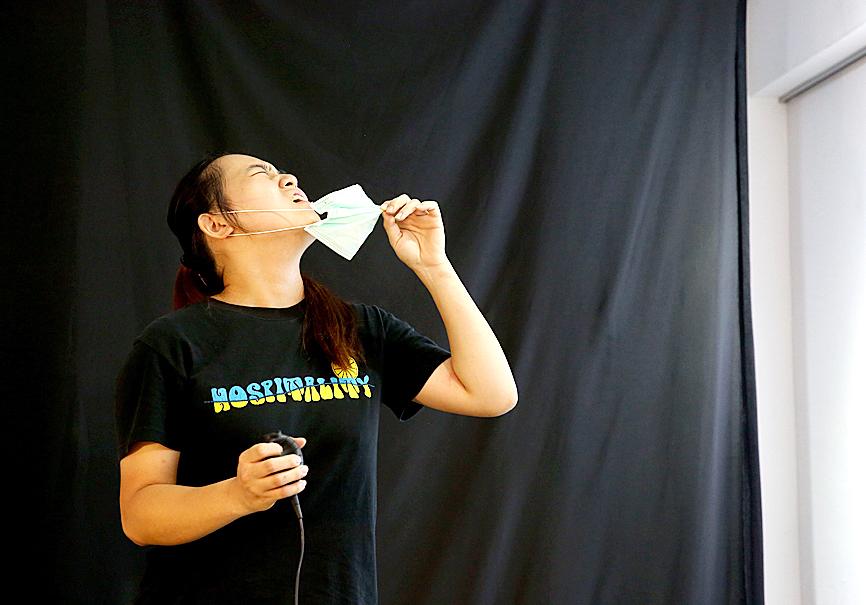Inside a cramped studio, Jane Chen pulled a mask from her face, breathed in deeply and pressed a remote camera shutter for an art project documenting how Taiwan has coped with COVID-19.
“I want to tell everyone to treasure their every breath of fresh air,” the 23-year-old hospitality student told reporters after the photo shoot.
Taiwan was one of the first places struck by the pandemic when it burst out of central China late last year.

Photo: AFP / Hsu Tsun-hsu
The nation has been hailed as an example of how to stop the virus in its tracks, with just seven deaths and 467 cases.
However, while it has avoided the lockdowns seen elsewhere, everyday life has been transformed — in particular by the near-universal adoption of masks.
That was something British documentary photographer Naomi Goddard, who settled in Taiwan a year ago, wanted to explore.
So she invited friends and strangers alike to take portraits of themselves in masks, accompanied by a handwritten note documenting their experiences.
“The virus is obviously going to be an important part of our history, so I felt compelled to document it in some way,” Goddard told reporters at her studio in downtown Taipei.
Pilates instructor Tina Liu, 25, came to the studio alongside her boyfriend Hugo Lin. The pair faced each other and embraced as the flash flared.
The first month of the outbreak felt like an apocalypse, Liu said, recalling the panic-buying and anxious lines for masks.
“Taiwan is doing better than most now, but it seems like the end of the world in some countries,” she added.
Like millions worldwide, Liu and her boyfriend lost their jobs during the pandemic.
“Everything all came so suddenly, like the virus, it derailed our lives,” Liu added. “But we strived and our relationship is actually better.”
Notes left by other subjects revealed how the virus has upended lives, even in a place left relatively unscathed by the pandemic.
Megan, a tattooed hairdresser, detailed how she opened a new shop in January only to see business dry up.
“You never know what life would throw at you,” she wrote. “I still consider myself lucky, at least my shop is open and running.”
Dressed in his uniform, airline pilot Kevin wrote how he now has to spend weeks in quarantine each time he flies to a new country and when he returns home.
“I can’t say that it’s been easy for myself or my family to be apart so much,” he wrote. “But this is our reality now.”
Goddard shot her own portrait for the project, sitting naked on top of a ladder she had used to get her studio up and running, a gas mask over her face.
Her nudity, she said, portrayed the vulnerable feeling the virus had left her with.
She said the pandemic has exposed which countries were ready for the challenge.
“It’s the first time in a very long period where you can kind of compare country by country, side by side, how the governments are operating in basically the exact same situation,” she said.
Her family in the UK were worried when the virus first emerged because of Taiwan’s proximity to China.
Now she feels lucky to be where she is.
“We’re so glad to be here. Our lives, compared to back home, haven’t changed at all,” she said.

An essay competition jointly organized by a local writing society and a publisher affiliated with the Chinese Communist Party (CCP) might have contravened the Act Governing Relations Between the People of the Taiwan Area and the Mainland Area (臺灣地區與大陸地區人民關係條例), the Mainland Affairs Council (MAC) said on Thursday. “In this case, the partner organization is clearly an agency under the CCP’s Fujian Provincial Committee,” MAC Deputy Minister and spokesperson Liang Wen-chieh (梁文傑) said at a news briefing in Taipei. “It also involves bringing Taiwanese students to China with all-expenses-paid arrangements to attend award ceremonies and camps,” Liang said. Those two “characteristics” are typically sufficient

A magnitude 5.9 earthquake that struck about 33km off the coast of Hualien City was the "main shock" in a series of quakes in the area, with aftershocks expected over the next three days, the Central Weather Administration (CWA) said yesterday. Prior to the magnitude 5.9 quake shaking most of Taiwan at 6:53pm yesterday, six other earthquakes stronger than a magnitude of 4, starting with a magnitude 5.5 quake at 6:09pm, occurred in the area. CWA Seismological Center Director Wu Chien-fu (吳健富) confirmed that the quakes were all part of the same series and that the magnitude 5.5 temblor was

The brilliant blue waters, thick foliage and bucolic atmosphere on this seemingly idyllic archipelago deep in the Pacific Ocean belie the key role it now plays in a titanic geopolitical struggle. Palau is again on the front line as China, and the US and its allies prepare their forces in an intensifying contest for control over the Asia-Pacific region. The democratic nation of just 17,000 people hosts US-controlled airstrips and soon-to-be-completed radar installations that the US military describes as “critical” to monitoring vast swathes of water and airspace. It is also a key piece of the second island chain, a string of

The Central Weather Administration has issued a heat alert for southeastern Taiwan, warning of temperatures as high as 36°C today, while alerting some coastal areas of strong winds later in the day. Kaohsiung’s Neimen District (內門) and Pingtung County’s Neipu Township (內埔) are under an orange heat alert, which warns of temperatures as high as 36°C for three consecutive days, the CWA said, citing southwest winds. The heat would also extend to Tainan’s Nansi (楠西) and Yujing (玉井) districts, as well as Pingtung’s Gaoshu (高樹), Yanpu (鹽埔) and Majia (瑪家) townships, it said, forecasting highs of up to 36°C in those areas